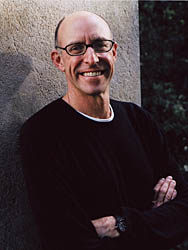Omnivore’s Solution
Michael Pollan and “In Defense of Food: The Omnivore’s Solution”
An edited transcript of Pollan’s Oct. 27 Otis Lecture at Bates.

On Oct. 27, 2008, food writer Michael Pollan offered the Otis Lecture at Bates. Herewith, an edited transcript of his remarks, divided into sections for easier reading. Use the links at right or at the end of the page to go to the next section.
I want to thank Tom Wenzel and the Otis Committee for inviting me. It’s a wonderful opportunity. Tom’s been incredibly generous, not only in inviting me but in accompanying me all day, showing me around the campus, the dining hall, local farms. I’ve had a wonderful day in the community and I feel like I’ve been welcomed into it very warmly, and I appreciate that.
I want to also thank the benefactors of this lecture series, the family of Philip Otis. From everything I’ve heard, it’s a great honor to be associated with his memory in any way and especially when you’re listed among the distinguished speakers — what a list! Full of heroes, influences and friends, actually.
I also want to say that from everything I’ve seen here today, this is a community that is very sensitive to the political and ecological implications of our eating choices. I see evidence of this all over this campus, in Commons, in the attitude toward food in this place. So you are very lucky and I don’t know if you have not been on as many college campuses as I have in the last year or two, you probably don’t know how quite how lucky you are. You’re light-years ahead of many other places in terms of rethinking your relationship of this institution to the local food community.
Plus you have this incredible football team (laughter). Their stunning success, I hope has something to with the food being served in Commons,
I want to talk tonight about health in the largest sense of that word. And I want to try and connect some of the dots between food and health. Our health, our personal bodily health, but also the health of the community and health of the land. And I want to talk about more solutions than problems, and see if we can’t solve some of the dilemmas that many of us are feeling around food.
How many in this room have read The Omnivore’s Dilemma?
(About half of the audience.) Wow. Well some of you may feel about that experience the way other readers I’ve talked to have, that in some ways it sharpened the dilemmas instead of alleviating them. And I kept hearing from readers who would tell me, you know, I can’t get to the end of your book.”
Those are very disturbing words for a writer — he wants you to get to the last page.
They say something like, “Every time I turn the page there’s something else I don’t feel good about eating anymore. And if I go all the way to the end, I’m afraid I might starve.” And this struck me as very curious. I guess I did complicate things for people, but there are a lot of very good solutions out there, very good alternatives. And I realized I needed to work to be a little more explicit.
So to the extent that that book was about following our food back to its source to answer this very simple question, Where does our food come from? — a question, by the way, that nobody needed to read books to figure out, 100 years ago or 75 years ago — there was still another question to be answered which was, OK, given what we know about our food and where it comes from, what and how should I change?
So I’m going to dwell on those questions today and then try to connect them back to some of the environmental questions of Omnivore’s Dilemma. My premise here, and I hope it will seem sensible to you by the end of this talk, is that there is no healthy diet, there is no healthy population, without a healthy agriculture. We cannot divorce these two things from the genius of science or personal discipline or whatever it might be. These two things are indissolubly linked.